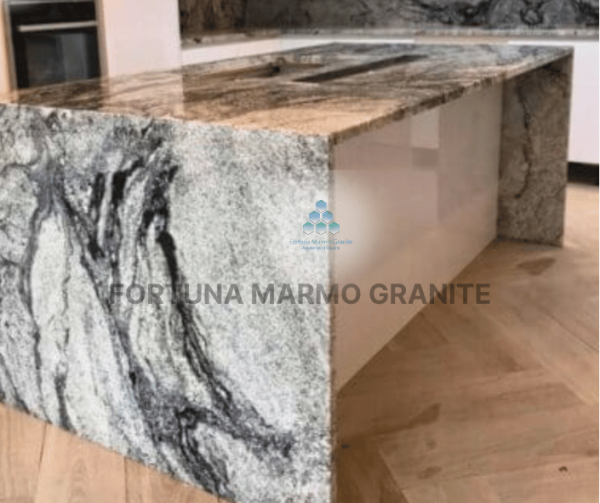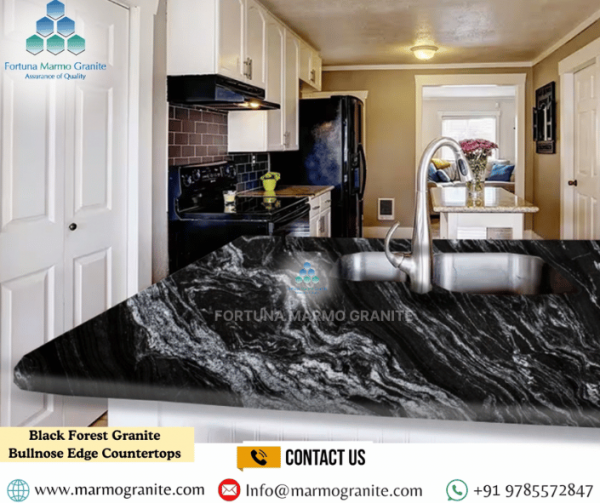Understanding the Thickness of Granite Countertops
Granite countertops are a hallmark of luxury and durability, known for their timeless beauty and lasting strength. They have remained a top choice for kitchens and bathrooms for decades because they resist heat, scratches, and daily wear. To achieve both style and functionality, it's essential to understand the importance of granite countertop thickness.
Granite countertops come in different thicknesses, and each offers unique advantages based on your design, purpose, and durability needs. In this blog, we'll explore the available granite thickness options, their benefits, and how to choose the best one for your space.
What is Granite?
Granite is a natural igneous rock that forms when magma cools and solidifies beneath the earth's surface. It mainly contains quartz, feldspar, and mica, which give it exceptional durability, strength, and beauty. Every granite slab is unique, displaying natural veins, flecks, and patterns that make it a favorite for countertops.
Known for its strength and resistance to scratches, heat, and stains, granite is among the most durable countertop materials. However, the thickness of the slab plays a major role in its appearance, durability, and cost. Choosing the right thickness ensures your countertop meets both functional and aesthetic needs.
Common Thickness Options for Granite Countertops
Granite countertops typically come in a few standard thickness options, usually ranging from 1 cm (10 mm) to 3 cm (30 mm). Each thickness option has its unique advantages and may be more suitable for specific applications. Let's explore the most common granite countertop thicknesses:
1 cm (10 mm) Thick Granite Countertops
What It Is: 1 cm thick granite is the thinnest option available for countertops. This thickness is less common for kitchen applications but can be found in certain specialized projects.
Advantages:
- Lightweight: Because it is thinner, it is lighter and easier to transport and handle during installation. This can be beneficial if the countertop is large or if the space is smaller, as it places less weight on cabinetry.
- Cost-Effective: Due to the reduced material volume, 1 cm granite tends to be less expensive than thicker options.
- Modern Aesthetic: The thin profile can create a sleek, modern look that works well with contemporary or minimalist designs.
Limitations:
- Durability Concerns: 1 cm granite is not as durable as thicker options. It can be prone to cracking, chipping, or breaking under pressure, making it unsuitable for heavy-duty applications like kitchen countertops where cutting and cooking occur regularly.
- Not Suitable for Edges: Because of its thinness, 1 cm granite typically cannot be used with standard countertop edges and may require additional support to prevent sagging.
2 cm (20 mm) Thick Granite Countertops
What It Is: 2 cm granite countertops are a step up in thickness compared to the 1 cm option. This thickness is commonly used in both residential and commercial applications.
Advantages:
Durability: The 2 cm thickness provides an ideal balance between strength and style. It can handle daily kitchen activities such as heat exposure, cutting, and food preparation without easily getting damaged.
Cost-Friendly: A 2 cm granite slab is also more budget-friendly than thicker options. It allows homeowners to enjoy the elegance and durability of granite countertops without overspending.
Limitations:
- Limited Strength: While 2 cm granite is a significant upgrade over 1 cm granite, it may not be as durable as the thicker 3 cm options. It might require additional support in certain situations, especially for larger or heavy-duty countertops. In some cases, the 2 cm granite might require additional support, such as plywood backing or reinforced cabinetry, to ensure it remains structurally sound over time.
3 cm (30 mm) Thick Granite Countertops
What It Is: 3 cm granite countertops are the thickest and most common option in residential kitchens. These countertops are incredibly strong, durable, and provide a luxurious look that many homeowners desire.
Advantages:
- Maximum Durability: With 3 cm thickness, granite countertops are extremely durable and can handle significant weight and use. They are less prone to cracking or chipping under pressure and are ideal for high-traffic areas like the kitchen.
- No Additional Support Needed: One of the biggest benefits of 3 cm granite is that it does not require additional support, unlike thinner granite options. This means there is no need for plywood backing or reinforcing under heavy countertops, simplifying installation.
- Enhanced Appearance: The thick, bold look of 3 cm granite adds an element of luxury to any space. It offers a more dramatic appearance that complements both modern and traditional kitchens. The added thickness also allows for more intricate edge designs, giving you more flexibility with your countertop's edge profile.
Limitations:
- Higher Cost: Naturally, 3 cm granite is the most expensive option due to the greater amount of material required. The installation costs are also higher due to the need for special equipment to handle the heavier slabs.
- Heavier Weight: The heavier nature of 3 cm granite means that the cabinetry beneath the countertop must be properly reinforced to support its weight. Additionally, the increased weight can make installation more challenging.
- Additionally, the increased weight can make the installation process more challenging, requiring specialized equipment and extra manpower to safely transport and position the slabs. Handling and cutting 3 cm granite requires skilled installers to ensure precise measurements and avoid breakage, which can add to both the time and cost of installation.
Conclusion
Understanding granite countertop thickness is essential when choosing the right option for your kitchen or bathroom. A sleek 1 cm slab suits minimalist designs, while a sturdy 3 cm option provides extra durability and a luxurious look. Each thickness offers unique benefits that match different design and performance needs. Your choice should balance aesthetics, function, budget, and weight considerations to find the best fit for your space.
At Fortuna Marmo Granite, we specialize in providing high-quality granite countertops, with a variety of thickness options to suit every style and budget. Our team is dedicated to helping you make an informed decision, ensuring your countertops not only enhance the beauty of your space but also stand the test of time. Whether you're updating your kitchen or designing a new one, we're here to guide you through the process and provide expert advice. Let us help you find the perfect granite countertop thickness to create the kitchen or bathroom of your dreams.



